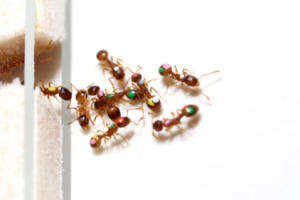The Dark Side of Almond Use
Geege Schuman stashed this in Beezzzzzz
Stashed in: Facts, Green, Awesome, California, New Yorker, Fishies!, Bugs!, The World, World Hunger, Environmental Impacts, Oasis, uh oh, Nuts!
I knew the almond's impact on water and salmon, but I didn't consider the bees!
California's almond industry is also completely reliant on honeybees to pollinate its almond trees. The industry requires 1.4 million bee colonies, according to the USDA, most of which are brought to the state from across the country. Because of colony collapse disorder, honeybees are a commodity. The almond farmers' requirements represent approximately 60 percent of the country's managed colonies. This year many of the mercenary pollinating bees brought to California died due to exposure to pesticides.
Anyway, when I buy almonds, I don't think about having a hand in killing bees or salmon, or getting someone's truck stolen or collapsing a road. It's just a jumble of what's "good for me," what I feel like eating, and how much things cost. Michael Specter’s feature on GMOs in last week's New Yorker gets into how seven billion people on the planet will be 10 billion by the end of the century, and feeding that population might well be the greatest challenge to humanity ever. Thinking about going easy on almonds is sort of analogous to GMO dilemmas or buying organic, where the point isn’t really nutrition, it's environmental consciousness and sustainability, which always come back to water. Thinking about that side of food makes it hard to write about nutrition in isolation. Anyway, almonds are good for our hearts.
That's nuts.
Should we stop eating almonds?
With California producing 82% of the world's almonds, your drought-stricken state might have to make the decision for us.
God NO!!
Please no!
Pretty please no?
hahahaha! you guys are like a comedy show!
It's easy to give up lots of things, but it would not be easy to give up almonds.
Michael Specter's feature on GMOs in the New Yorker:
This is so good. Thanks so much!
Happily! You're right, it's a good read.
Shiva, along with a growing army of supporters, argues that the prevailing model of industrial agriculture, heavily reliant on chemical fertilizers, pesticides, fossil fuels, and a seemingly limitless supply of cheap water, places an unacceptable burden on the Earth’s resources. She promotes, as most knowledgeable farmers do, more diversity in crops, greater care for the soil, and more support for people who work the land every day. Shiva has particular contempt for farmers who plant monocultures—vast fields of a single crop. “They are ruining the planet,” she told me. “They are destroying this beautiful world.”
The global food supply is indeed in danger. Feeding the expanding population without further harming the Earth presents one of the greatest challenges of our time, perhaps of all time. By the end of the century, the world may well have to accommodate ten billion inhabitants—roughly the equivalent of adding two new Indias. Sustaining that many people will require farmers to grow more food in the next seventy-five years than has been produced in all of human history. For most of the past ten thousand years, feeding more people simply meant farming more land. That option no longer exists; nearly every arable patch of ground has been cultivated, and irrigation for agriculture already consumes seventy per cent of the Earth’s freshwater.
The nutritional demands of the developing world’s rapidly growing middle class—more protein from pork, beef, chicken, and eggs—will add to the pressure; so will the ecological impact of climate change, particularly in India and other countries where farmers depend on monsoons. Many scientists are convinced that we can hope to meet those demands only with help from the advanced tools of plant genetics. Shiva disagrees; she looks upon any seed bred in a laboratory as an abomination.
It seems like we've hit Peak Almond.
And peak Kale. But hopefully not peak Marijuana.
i'm so glad marijuana keeps making its way back into this conversation!
We believe in the interconnectedness of all things. Marijuana is a gateway.
Almonds, kale, ... And quinoa.
http://pandawhale.com/post/52471/quinoa-pumpkin-porridge-detoxinista
More on the worsening almond problem:












12:47 PM Aug 28 2014